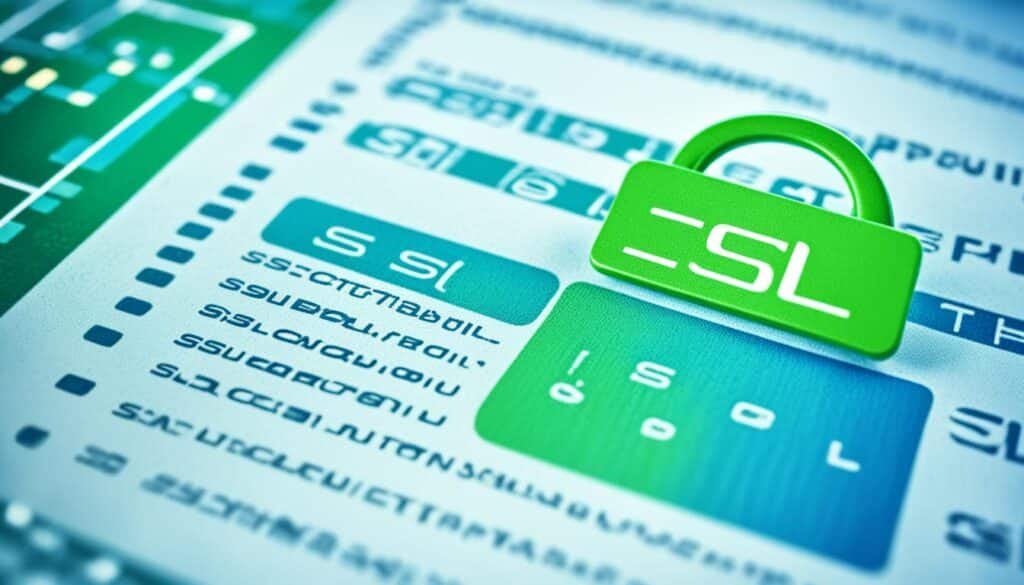E-commerce security is of paramount importance in today’s digital landscape. With the increasing number of online transactions and the rising threat of cyberattacks, safeguarding customer data has become a top priority for e-commerce businesses. The security and trustworthiness of an e-commerce website directly impact customer confidence and can make or break an online business.
Implementing robust security measures is essential to protect against security threats such as hackers, data breaches, phishing attacks, and DDoS attacks. By adhering to industry standards, such as the Payment Card Industry Data Security Standard (PCI DSS), and following best practices, e-commerce businesses can ensure the security of customer information and provide a safe online shopping experience.
Key Takeaways:
- E-commerce security plays a crucial role in protecting customer data and building trust.
- Implement effective security measures to safeguard against common threats like data breaches, phishing attacks, and DDoS attacks.
- Choose a secure e-commerce platform and payment gateway that adhere to industry standards.
- Regularly update security measures and stay informed about the latest threats and vulnerabilities.
- Protect sensitive customer information by using secure socket layer (SSL) certificates and following secure coding practices.
The Stakes Are High
E-commerce transactions involve sensitive customer information, including credit card details and sensitive information like personal data. Protecting this information is crucial, as any breach can have severe consequences. Unauthorized access to credit card information can result in financial losses for customers and the e-commerce site. Additionally, the exposure of sensitive information can lead to identity theft, which can cause significant harm to individuals. Moreover, a data breach can damage the reputation of the e-commerce business, resulting in a loss of customer trust and a decrease in sales.
Therefore, it is paramount to implement effective security measures to protect customer data and maintain the integrity of the commerce process. From secure payment gateways to robust data protection practices, businesses must prioritize security standards to safeguard against e-commerce security threats, such as brute force attacks and the introduction of malicious code into the system.
“The consequences of a security breach can be devastating. It is imperative to take proactive steps to prevent the compromise of customer information and ensure the security of the e-commerce site.”
To protect customer data, e-commerce businesses should adhere to industry-standard data protection practices and implement security measures that align with established security standards. This includes using secure payment gateways, encrypting sensitive information, and regularly monitoring and updating commerce platforms for potential vulnerabilities. By doing so, businesses can minimize the risk of a security breach and protect customer data from falling into the wrong hands.
In conclusion, the stakes are high when it comes to e-commerce security. The protection of credit card information and other sensitive information is vital to maintaining the trust of customers and the reputation of the e-commerce business. By implementing robust security measures and staying vigilant against emerging e-commerce security threats, businesses can ensure the safety and integrity of commerce transactions, offering customers peace of mind and fostering long-term success.
Protecting Customer Data: Strategies For E-commerce Security
| Protection Strategies | Description |
|---|---|
| Implement Secure Payment Gateways | Ensure that payment gateways used are reliable and comply with security standards to protect customer payment information. |
| Encrypt Sensitive Information | Use encryption technologies to protect credit card details and other sensitive information from unauthorized access. |
| Regularly Update Security Measures | Maintain up-to-date security measures to mitigate security vulnerabilities and protect against emerging threats. |
| Follow Data Protection Best Practices | Adopt industry-standard practices, such as securely storing customer information and conducting regular security audits. |
- Credit card information and sensitive information must be protected to prevent financial losses and identity theft.
- Robust data protection measures, such as encryption and secure payment gateways, are essential to safeguard customer data.
- Adherence to security standards and protection against e-commerce security threats like brute force attacks and malicious code is crucial for e-commerce security.
- Implementing best practices, such as regular security updates and following data protection guidelines, helps to maintain the integrity of customer information.
The Role of SSL Certificates

When it comes to safeguarding sensitive information on an ecommerce site, secure socket layer (SSL) certificates play a crucial role. By encrypting the data exchanged between the user’s browser and the ecommerce website’s server, SSL certificates ensure that even if a cybercriminal intercepts the data, it is virtually impossible to decipher. This encryption provides an additional layer of security, protecting credit card information and other sensitive data from potential threats.
SSL certificates also offer a range of security features that contribute to the overall ecommerce site security. One such feature is the identification of secure connections through a padlock symbol displayed in the browser’s address bar. This symbol provides reassurance to users that their connection is secure and their sensitive information is being protected.
Implementing SSL certificates is essential for ecommerce sites as they defend against common ecommerce security threats. By encrypting data, SSL certificates help guard against potential attacks, such as man-in-the-middle attacks and data interception. These security protocols create a secure environment for users to enter their credit card information and trust that it will remain confidential.
SSL certificates play a vital role in ensuring the security and trustworthiness of ecommerce sites. By encrypting data and providing security features, they protect sensitive information and defend against common ecommerce security threats.
Here is a table summarizing the benefits of SSL certificates in ecommerce security:
| Benefits of SSL Certificates |
|---|
| Encryption of sensitive data |
| Identification of secure connections |
| Protection against common ecommerce security threats |
By implementing SSL certificates and utilizing their security features, ecommerce sites can create a safer and more secure environment for customers to make transactions and share sensitive information.
Choosing the Right Payment Gateways

When it comes to running an e-commerce business, protecting your customers’ payment information is paramount. One of the key components of ensuring the security of credit card data is selecting the right payment gateway. A reliable payment gateway is crucial for securely processing credit card transactions between your website and financial institutions, providing the necessary encryption and authentication protocols to safeguard sensitive data.
So, what factors should you consider when choosing a payment gateway for your e-commerce business? Let’s take a look at some security best practices and key considerations:
Security Best Practices for Payment Gateways
- PCI DSS Compliance: It is essential to choose a payment gateway that complies with the Payment Card Industry Data Security Standard (PCI DSS). PCI DSS sets the security standards for handling sensitive credit card data and ensures that your business is following the necessary protocols to protect your customers’ payment information.
- Encryption and Security Features: Look for a payment gateway that employs robust encryption methods, such as secure socket layer (SSL) technology, to protect credit card details during transmission. Additionally, check if the payment gateway offers advanced security features like tokenization and fraud detection.
- Supported Payment Methods: Consider the payment methods that the gateway supports, both locally and internationally. Offering a wide range of payment options improves the user experience and ensures that customers can complete transactions securely using their preferred payment methods.
- Integration and User Experience: Evaluate the ease of integration with your e-commerce platform and the overall user experience. A user-friendly payment gateway reduces friction during the checkout process, enhancing conversion rates and customer satisfaction.
- Transaction Fees and Costs: Compare the transaction fees and costs associated with different payment gateways. While cost should not be the sole consideration, it is essential to find a payment gateway that aligns with your business’s budget and offers competitive pricing.
By carefully considering these factors and conducting proper due diligence, you can select a payment gateway that suits your business’s needs while prioritizing the security of your customers’ credit card data.
Remember, choosing the right payment gateway is not a one-size-fits-all approach. Each e-commerce business is unique, so take the time to assess your requirements and select a payment gateway that aligns with your specific needs.
Now, let’s take a look at a comparison table that outlines some popular payment gateways and their key features:
| Payment Gateway | Supported Payment Methods | PCI DSS Compliance | Encryption & Security Features | Transaction Fees |
|---|---|---|---|---|
| Stripe | Credit Cards, Debit Cards, Digital Wallets | Yes | SSL Encryption, Tokenization, Fraud Detection | 2.9% + 30 cents per transaction |
| PayPal | PayPal, Credit Cards, Debit Cards | Yes | SSL Encryption, Buyer/Seller Protection | 2.9% + 30 cents per transaction |
| Authorize.Net | Credit Cards, Debit Cards | Yes | SSL Encryption, Tokenization, Fraud Detection | $25 monthly gateway fee + transaction fees |
Please note that the table above is for illustrative purposes only and does not represent an endorsement of any specific payment gateway. It is always recommended to conduct thorough research and assess your business’s unique requirements before selecting a payment gateway.
Choosing the right payment gateway is an essential step in protecting your e-commerce business and securing your customers’ credit card details. By following security best practices and choosing a PCI DSS-compliant payment gateway, you can ensure the security of your online transactions and gain the trust of your customers.
Data Protection and Compliance

E-commerce businesses have a crucial responsibility to protect and safeguard valuable customer data. This includes implementing robust data protection measures to ensure the security and integrity of customer information. Regular security audits play a vital role in identifying vulnerabilities and patching any security flaws that may arise. Compliance with regulations like the General Data Protection Regulation (GDPR) is also imperative, especially for serving European customers.
One of the key aspects of data protection is encryption, which involves converting plain text into unreadable code to prevent unauthorized access. By implementing encryption protocols, e-commerce businesses can significantly enhance the security of sensitive customer data, such as personal information and payment details. This ensures that even if a data breach occurs, the stolen data will be essentially useless to cybercriminals.
Furthermore, regular security audits help assess the effectiveness of an e-commerce website’s security measures. These audits are conducted by skilled professionals who thoroughly analyze the website’s infrastructure, applications, and coding practices to identify any security vulnerabilities. By addressing these vulnerabilities promptly, businesses can minimize the risk of security breaches and protect the trust customers place in them.
Secure coding practices are another essential aspect of data protection and compliance. By following secure coding guidelines and best practices, such as input validation and output encoding, e-commerce businesses can reduce the risk of security flaws in their applications and websites. Implementing proper error handling, user authentication, and access control measures also plays a significant role in ensuring data security.
E-commerce businesses must also be mindful of security concerns that arise with the increasing integration of digital technologies. This includes considering the security implications of emerging technologies such as Internet of Things (IoT) devices and cloud computing. By evaluating potential security risks and implementing appropriate safeguards, businesses can stay ahead of potential threats and protect customer data.
Overall, data protection and compliance are integral to the successful operation of any e-commerce business. By implementing encryption, conducting regular security audits, following secure coding practices, and addressing security concerns, businesses can ensure the secure handling of customer data and maintain compliance with relevant regulations. These measures not only provide strong protection against security threats but also instill confidence in customers, establishing the business as a trusted and reliable source for online transactions.
The Consequences of a Breach

E-commerce security goes beyond being a protective measure; it is also a proactive one. A single data breach can have far-reaching consequences for a business, leading to substantial financial losses, legal issues, and reputational damage. The implications go beyond the immediate impact, as customer trust, that may have taken years to build, can rapidly erode.
“Security breaches can result in severe financial and legal ramifications. Businesses may face hefty fines or lawsuits due to non-compliance with data protection regulations. The fallout from a breach can tarnish a company’s reputation, leading to loss of customers, partners, and investors.”
Financial losses resulting from a breach can be significant, ranging from expenses related to handling the breach, compensating affected customers, and potential business disruptions. In addition, businesses may face steep fines for non-compliance with data protection regulations, such as the General Data Protection Regulation (GDPR) or industry-specific standards. Legal issues can arise from claims and lawsuits brought by affected parties, and these cases can be time-consuming, costly, and damaging to a business’s reputation.
Speaking of reputation, reputational damage can be one of the most severe consequences of a breach. The loss of customer trust can have a long-lasting impact, leading to decreased sales, cancellation of partnerships, and less investor confidence. Rebuilding trust can take time and substantial effort, while the effects of a damaged reputation may persist for years.
E-commerce businesses must recognize the importance of investing in data breach prevention and e-commerce security. Implementing robust security measures is crucial for protecting sensitive customer data, maintaining legal compliance, and safeguarding the reputation of the business.
The impact of a breach can include:
- Financial losses: Fines, legal fees, compensating affected parties, and business disruptions can lead to significant financial strain.
- Legal issues: Non-compliance with data protection regulations can result in fines, lawsuits, and damage to a business’s reputation.
- Reputational damage: Loss of customer trust and damaged reputation can have long-term consequences, impacting sales and partnerships.
E-commerce security should be viewed as an investment in the long-term success and reputation of the business. By prioritizing customer trust and implementing comprehensive security measures, e-commerce businesses can mitigate the risks associated with data breaches and protect their bottom line.
Collect Only Data You Will Use

E-commerce businesses should prioritize responsible data collection practices to minimize data liability and protect sensitive customer information. By collecting only the necessary data, businesses can reduce the risk of potential security breaches and comply with industry standards, such as the Payment Card Industry Data Security Standard (PCI DSS).
Storing sensitive information like credit card numbers online poses significant risks and can lead to data breaches if not adequately protected. E-commerce businesses should exercise caution and consider alternative methods for processing payments securely, such as tokenization or utilizing secure payment gateways that comply with PCI standards.
Minimizing the amount of sensitive information stored online is essential to mitigate data liability and protect the privacy of customers. This includes implementing data retention policies that outline how long customer data will be stored and the purpose for which it will be used. By being transparent with customers about data collection practices, businesses can foster trust and demonstrate their commitment to data protection.
“We believe that collecting only necessary customer data is crucial for maintaining data security and protecting the privacy of our customers. By analyzing our data collection practices and ensuring PCI compliance, we can minimize data liability and maximize customer trust.” – Jane Smith, CEO of XYZ E-commerce Company
Key Considerations for Responsible Data Collection:
- Evaluate Your Data Collection Needs: Assess the specific information required for the smooth functioning of your e-commerce business, such as shipping addresses, email addresses, or product preferences.
- Implement Data Minimization Strategies: Collect only the minimum amount of data necessary to fulfill orders and provide necessary services. Avoid collecting unnecessary personal details that could pose a higher risk in the event of a breach.
- Establish Clear Data Retention Policies: Define how long customer data will be stored and communicate this to your customers in your privacy policy. Regularly review and securely dispose of outdated or unnecessary data that is no longer required.
- Securely Store and Transmit Data: Utilize secure storage methods and encryption techniques to protect stored data and secure transmission of sensitive information.
- Observe Industry Compliance Standards: Stay up-to-date with the latest industry standards and comply with regulations like the PCI DSS to ensure the security and privacy of customer data.
HTTP + SSL = HTTPS

Implementing SSL certificates and transitioning from HTTP to HTTPS is fundamental for e-commerce security. SSL certificates play a crucial role in establishing a secure connection between the user’s browser and the website’s server. By encrypting the data exchanged during online transactions, SSL certificates ensure the confidentiality and integrity of sensitive information, such as customer details and payment data. This encryption process protects the data from unauthorized access or interception by cybercriminals.
By adopting HTTPS, e-commerce websites can enhance their security measures and build trust with customers. The “s” in HTTPS stands for secure, indicating that the website employs SSL certificates to establish a secure connection with users. This visible confirmation of a secure connection boosts customer confidence and reassures them that their data is protected. Trust is a critical factor in e-commerce, and by prioritizing a secure connection through HTTPS, businesses can cultivate trustworthiness and promote a positive shopping experience for their customers.
“The transition from HTTP to HTTPS is an essential step in ensuring the security and trustworthiness of an e-commerce website. By encrypting the data transmitted between users and the website, SSL certificates provide a robust layer of protection against cyber threats, such as data breaches and unauthorized access. This demonstrates a commitment to customer security and strengthens the overall credibility of the online business.”
Furthermore, HTTPS has become increasingly important for search engine optimization (SEO) purposes. Major search engines, including Google, prioritize secure websites in search results. This means that by implementing SSL certificates and enabling HTTPS, e-commerce businesses can improve their website’s visibility and organic rankings, ultimately driving more traffic and potential customers to their site.
Benefits of SSL Certificates and HTTPS for E-commerce Security:
- Enhanced data protection and secure online transactions
- Building trust and credibility with customers
- Protection against data breaches and unauthorized access
- Improved search engine rankings and visibility
By adopting SSL certificates and transitioning to HTTPS, e-commerce businesses can prioritize security and ensure the trustworthiness of their online platforms. This commitment to customer data protection not only safeguards against potential security threats but also fosters a positive online shopping experience for consumers.
Be PCI DSS Compliant
To ensure secure transactions and protect customer data, it is essential for any e-commerce website that processes online transactions to be PCI DSS compliant. PCI DSS (Payment Card Industry Data Security Standard) is a universally accepted standard adopted by branded credit card companies.
Adhering to PCI DSS compliance standards demonstrates a commitment to maintaining the highest level of e-commerce security. By meeting these standards, e-commerce businesses establish themselves as safe and trustworthy platforms for conducting secure transactions.
PCI DSS compliance involves implementing specific security measures and protocols to safeguard sensitive customer information. This includes securing cardholder data, maintaining a secure network, regularly monitoring and testing security systems, and implementing strong access control measures.
By adhering to PCI DSS compliance, e-commerce businesses can protect against potential security breaches, mitigate risk, and instill confidence in their customers. Compliance with these security standards is crucial for maintaining the integrity of online transactions and ensuring the overall security of the e-commerce environment.
Update Security Measures Regularly

To ensure the ongoing security of your e-commerce store, it is crucial to prioritize regular software updates and maintain up-to-date security measures. By doing so, you can effectively prevent security vulnerabilities and potential hacking attempts that could compromise the integrity of your online business.
Hackers are constantly evolving their techniques and targeting outdated software that may have existing vulnerabilities. By staying proactive with software updates, you can safeguard against these threats and strengthen the overall security of your e-commerce site.
Regularly updating security measures encompasses more than just software updates. It also involves staying informed about the latest security threats and taking necessary precautions to prevent them. By staying up-to-date with industry trends and best practices, you can implement the necessary security measures to protect against potential security breaches.
Implementing robust security measures is an essential part of hack prevention and ensuring the safety of your customer’s data. By keeping a finger on the pulse of emerging threats and actively updating your security protocols, you can create a secure environment for your online store and instill trust in your customers.
Remember, security measures are not a one-time solution but an ongoing effort. Stay vigilant, stay informed, and regularly update your security measures to fortify the protection of your e-commerce store.
Also Read: Innovative E commerce Business Ideas for Success
Conclusion
E-commerce security is an essential aspect of running a successful online business. Safeguarding customer data and ensuring secure online transactions are crucial for establishing customer trust and maintaining the integrity of your e-commerce website. By following industry best practices and implementing robust security measures such as SSL certificates and secure payment gateways, you can enhance the security of your online store.
Investing in e-commerce security is not just about protecting your business from potential threats; it is also about safeguarding your customers’ sensitive information. By prioritizing data protection and staying updated on the latest security threats, you can provide a safe and trustworthy shopping experience for your customers.
Remember, maintaining e-commerce security is an ongoing effort. Regularly updating your security measures, staying compliant with industry standards, and being vigilant about potential vulnerabilities are essential for ensuring the long-term success and reputation of your online business. By prioritizing e-commerce security, you can build customer trust and pave the way for secure online transactions.
FAQs
Q: What are some common security threats faced by e-commerce businesses?
A: E-commerce businesses face various security threats such as data breaches, brute force attacks, insider threats, and cyber attacks.
Q: How can I secure my e-commerce website from malicious attacks?
A: To secure your e-commerce website, you can implement security practices like using strong passwords, conducting security training, and regularly updating your security measures.
Q: What are the best practices for e-commerce security?
A: Best practices for e-commerce security include implementing network security measures, conducting security audits, using encryption, and staying updated on common e-commerce security threats.
Q: Why is it important to protect customer data on an e-commerce platform?
A: Protecting customer data on an e-commerce platform is crucial to maintain trust with customers, comply with security standards, and prevent potential security breaches.
Q: How can I protect my online store from security risks?
A: You can protect your online store from security risks by using secure payment gateways, implementing two-factor authentication, monitoring for suspicious activities, and regularly updating your security protocols.
Q: What are some common types of cyber attacks on e-commerce websites?
A: Common types of cyber attacks on e-commerce websites include SQL injections, phishing scams, malware attacks, and DDoS attacks.
Q: How can I enhance security for my e-commerce business?
A: Enhancing security for your e-commerce business involves investing in security strategies, conducting regular security assessments, educating employees on security practices, and implementing multi-layered security measures.
Source Links




